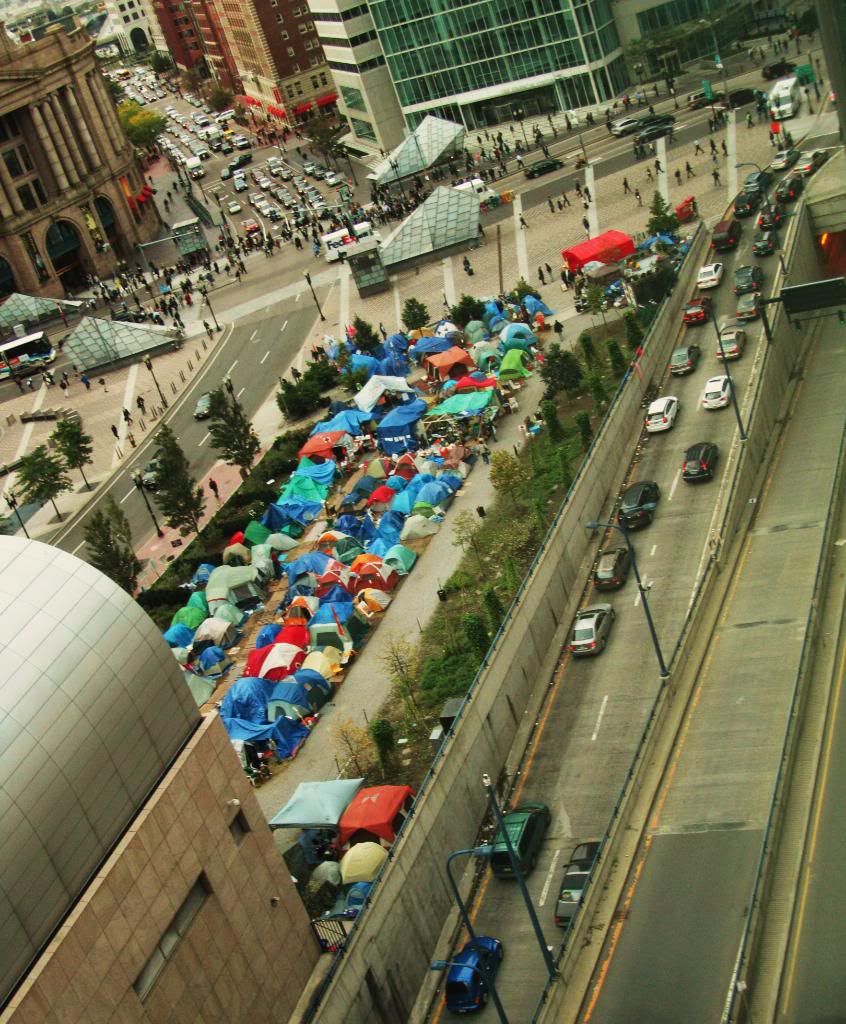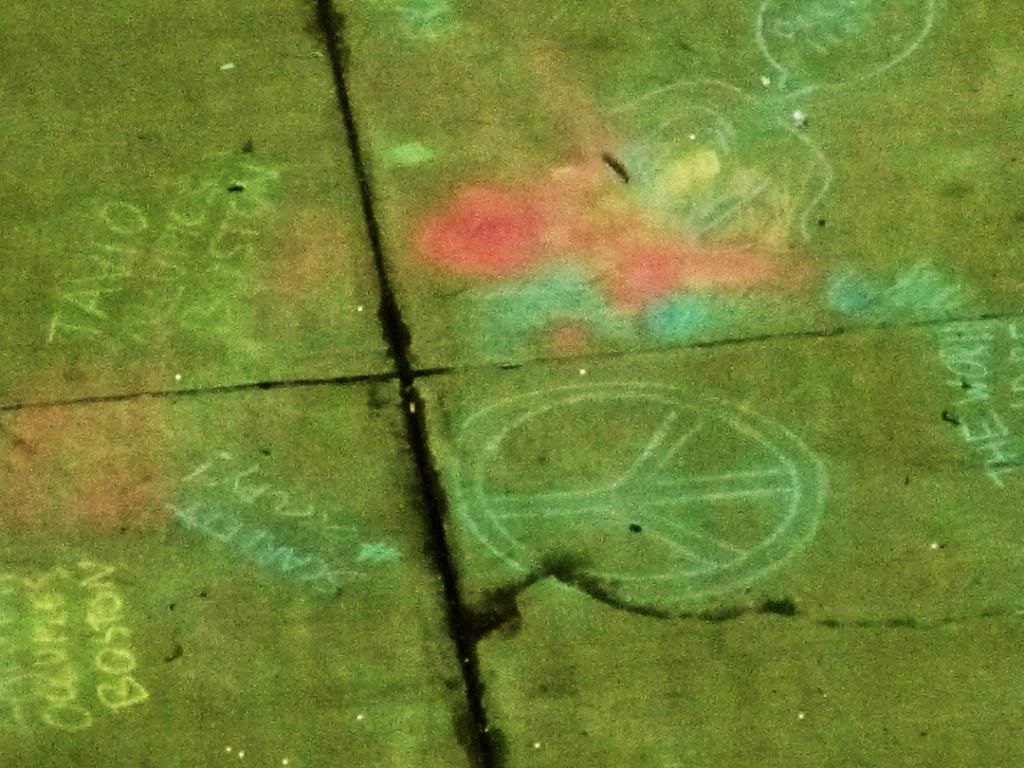Where in the US Constitution is public space is to be protected from use or trampling by civilians?
Where is a length of stay even remotely suggested in the US Constitution?
The framers feared the possibility of a government amassing too much power, so they were allowing for the possibility of governmental change through assembly and airing of grievances in public space -- regardless of how offended the sitting gov't was or other citizens were in the process.....
I'm not suggesting Occupy Boston is the be all and end all of protests, but it's hard to believe people are coming down on them in light of the kind of protests that the framers of the US Constitution were probably envisioning -- possibly much more repellent protests than we are used to.
At this point in history (and this discussion) I'm not sure the citizenry proves worthy of the protections. So if they are lost, it is nobody's fault but our own. Here we are talking about Woodstock, potential damage to plantings, worries about spilling red paint, etc. -- the framers would laugh!
UH -- the framers were not anarchists -- nowhere in the Constitution does it remotely say that vigilantism is protected -- indeed what you are suggesting is the total disruption of everyday society -- in most places that is not protest -- it means revolution
We had a dose of that after the US had an initial government -- Shay's Rebellion - some of the issues sound remarkably modern
from the wikipedia artilcle:
Daniel Shays was a poor farmhand from Massachusetts when the Revolution broke out. He joined the Continental Army where he fought at Battle of Lexington, Battle of Bunker Hill, and Battle of Saratoga, and was eventually wounded in action. In 1780, he resigned from the army unpaid and went home to find himself in court for the nonpayment of debts. He soon found that he was not alone in being unable to pay his debts, and began organizing for debt relief....
The financial situation leading to the rebellion included the problem that European war investors (among others) demanded payment in gold and silver; ...wealthy urban businessmen were trying to squeeze whatever assets they could get out of rural smallholders. Since the smallholders did not have the gold that the creditors demanded, everything they had was confiscated, including their houses.
At a meeting convened by aggrieved commoners, a farmer, Plough Jogger, encapsulated the situation:
"I have been greatly abused, have been obliged to do more than my part in the war, been loaded with class rates, town rates, province rates, Continental rates and all rates...been pulled and hauled by sheriffs, constables and collectors, and had my cattle sold for less than they were worth...The great men are going to get all we have and I think it is time for us to rise and put a stop to it, and have no more courts, nor sheriffs, nor collectors nor lawyers."
It was decided that the legislature (General Court) in Boston would be petitioned.....Veteran Luke Day of West Springfield, Massachusetts asked the judges holding the confiscatory hearings to adjourn until the Massachusetts legislature met....on September 19, the Supreme Judicial Court of Massachusetts indicted eleven leaders of the rebellion as "disorderly, riotous, and seditious persons." Incensed by the indictment, Shays organized seven hundred armed farmers, most of them war veterans, and led them to Springfield. As they marched their ranks grew, and some of the militia joined along with additional reinforcements from the countryside. Boston elites were mortified at this resistance. The judges first postponed hearings for a day, then adjourned the court. Massachusetts Governor James Bowdoin commanded the legislature to "vindicate the insulted dignity of government." Samuel Adams claimed that foreigners ("British emissaries") were instigating treason among the commoners, and he helped draw up a Riot Act, and a resolution suspending habeas corpus in order to permit the authorities to keep people in jail without trial. Adams proposed a new legal distinction: that rebellion in a republic, unlike in a monarchy, should be punished by execution.....
After several years of ad hoc popular conventions sending petitions to the Massachusetts General Court for tax and debt relief, and protesters shutting down local courts to prevent judges from enforcing debt collection, Massachusetts Governor James Bowdoin ….dispatched a militia financed by Boston merchants headed by former American Revolutionary War General Benjamin Lincoln as well as General William Shepard's local militia of 900 men to protect the Springfield court so that it could continue to process property confiscations.... The rebels were dispersed in January 1787 with over 1,000 arrested. Bowdoin declared that Americans would descend into "a state of anarchy, confusion, and slavery" unless the rule of the law was upheld.....Shays sent a message to Luke Day proposing to seize weapons from the Springfield armory on January 25, 1787, before Lincoln's 4,000-man combined Boston and Springfield militia could arrive. Day's response that his forces would not be ready until January 26 was never received by Shays (a real-world example of the Two Generals' Problem). Shays's militia approached the armory not knowing they would have no reinforcements.
General Shepard's forces were unpaid and without food or adequate arms. Shepard had requested permission to use the weaponry in the Springfield Armory, but Secretary of War Henry Knox had denied the request on the grounds that it required Congressional approval and that Congress was out of session....When Shays and his forces neared the armory, they found Shepard's militia waiting for them. Shepard ordered a warning shot; the two cannon present were fired directly into Shays's men. Four of the Shaysites were killed, twenty wounded. There was no musket fire from either side. Crying "Murder!", for they never thought that their neighbors and fellow veterans would fire at them, the rebels fled north. On the opposite side of the river, Day's forces also fled north. The militia captured many of the rebels on February 4 in Petersham, Massachusetts; by March there was no more armed resistance.....Shepard reported to his superiors that he had made use of the armory without authorization, and returned the weapons in good condition after the armed conflict had ended.
Several of the rebels were fined, imprisoned, and sentenced to death, but in 1788 a general amnesty was granted. Although most of the condemned men were either pardoned or had their death sentences commuted, two of the condemned men, John Bly and Charles Rose, were hanged on December 6, 1787....Shays himself was pardoned in 1788 and he returned to Massachusetts. ….Thomas Jefferson, who was serving as an ambassador to France at the time, refused to be alarmed by Shays' Rebellion. In a letter to a friend, he argued that a little rebellion now and then is a good thing. "The tree of liberty must be refreshed from time to time with the blood of patriots and tyrants. It is its natural manure."[18] In contrast to Jefferson's sentiments George Washington....in a letter to Henry Lee wrote in regard to the rebellion, "You talk, my good sir, of employing influence to appease the present tumults in Massachusetts. I know not where that influence is to be found, or, if attainable, that it would be a proper remedy for the disorders. Influence is not government. Let us have a government by which our lives, liberties, and properties will be secured, or let us know the worst at once." ….James Madison addressed this concept by stating that "Liberty may be endangered by the abuses of liberty as well as the abuses of power."


